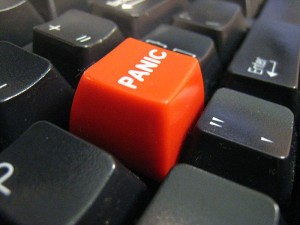control your brain: the stigma around panic attacks

Image Via Wikimedia Commons
It can difficult to explain panic attacks to people that have never experienced them before. Yes, I could rattle off the symptoms that are such a big part of them, like trembling, a sense of unreality, stomach pains, dizziness, a tight chest, difficulty swallowing, heart palpitations and numbness; but this doesn’t give anyone a real idea of what they’re like at all. Because how can you explain, really explain, the absolute conviction many have in the midst of them that they’re either dying or losing their mind? It’s not something that’s easy to understand until you have found yourself trembling on the bathroom floor or hiding in the stairwell at work, filled with indescribable terror.
“But if you know that it’s a panic attack then you know that you’re not dying, right?” I have gotten from the few people close to me that know I get them. And it makes sense when they say it. After all, if I’m experiencing something that I have felt hundreds of times before, know all of the symptoms and the physical reasons why they are occurring, and am entirely aware that what I’m having is a panic attack, then why does it still affect me so much?
For the simple reasons what when you’re in the middle of one, all rational thoughts go out the window and all that’s left is fear. When I’m having a panic attack I can’t actually feel anything around me – I can’t feel where my body connects with the chair or ground – and everything looks completely different. The colours are bright and blurry and things that were once familiar suddenly aren’t recognisable. I don’t really have the capacity to apply logic in those situations. The best that I can do is take myself somewhere cool and quiet, focus on my breath, and wait for it to pass.
The hard thing about panic attacks is that they can often be completely out of the blue. I could be sitting there thinking about what I’m going to eat for dinner and all of sudden all of the physical symptoms appear, which then lead into all of the thoughts and fears about those symptoms; turning to a vicious cycle where the physical and emotional feed off one another. I also found that when I was getting them regularly, my fight or flight symptom was completely malfunctioning. Near-accidents in the car on the way to work didn’t affect my pulse in the slightest, but I would get panic attacks when I was drifting off to sleep. So it’s not just a matter of challenging panic attacks when they happen, it’s also a matter of retraining your brain to recognise when adrenaline is needed, and when it absolutely isn’t (like sitting in a work meeting, going to sleep or chatting with a friend).
This time last year I had one so terrifying that I forced my husband to take me to hospital. While it was one of the most humiliating nights of my life, it was also a turning point. Because when you’re pacing back and forth in your pyjamas in an emergency waiting room muttering to yourself and suddenly exclaiming ‘I’m dying’ at the top of your lungs, then there’s really nowhere else to go but up.
As soon as I got home from that embarrassing night I started committing myself to online Cognitive Behaviour Therapy courses, meditation, yoga, regular exercise, saw a psychologist and gave up coffee and alcohol (which are known triggers for panic attacks). While there have been ups and downs and a few more downs and then some ups again, after what has felt like an extremely long time and more than a bit of effort, for the most part I’m panic attack free.
I have been embarrassed about my panic attacks for a long time, and 99% of people who know me don’t know that I get them. I have experienced a bit of stigma around it (like the doctor who snapped at me to ‘control my brain’) and a lot of confusion or dismissal from family members who can’t see why I can’t just stop them. Like I said at the beginning, they’re hard to understand, and most people don’t seem fond of openly discussing them, though they’re not an uncommon occurrence.
The important thing to realise, and it’s something that I’m still trying to work on even now, is that they’re nothing to be ashamed of. Bodies are complex, brains even more so, and we can’t control everything that happens. But we can work with it and learn from it. Like all mental health issues, the important first step is to acknowledge the issue and seek help. Without professional help, even with all of the hard work and best intentions in the world, there isn’t a great recovery rate for any mental health issue. That’s why it is so important to talk to someone about it and utilise the knowledge of people that have spent hundreds upon hundreds of hours doing research around these issues so that you don’t have to. After spending years trying to tackle my panic attacks alone and failing miserably, I learned that it is far better to swallow your pride and ask for help, because chances are it will change your life for the better.

